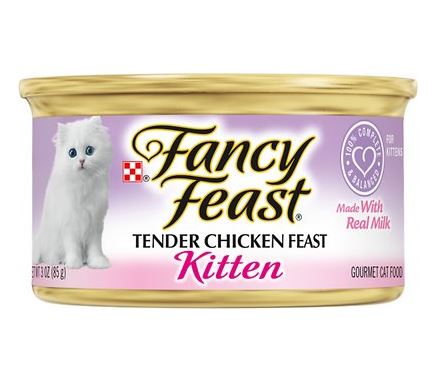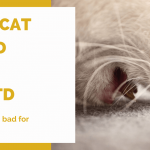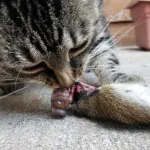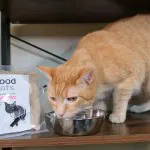Can Cats Eat Baby Food? Best Baby Food for Cats
Last Updated on
Simple meat-based baby food is an appetizing and easy-to-eat food for sick or elderly cats. In this article, we’ll talk about how baby food can be a great dietary supplement for some cats, which baby foods are best, and which types of baby food are never safe for your cat.
Again, it’s important to remember that just because meat-based baby food is safe for cats, it doesn’t mean that it’s a nutritionally complete meal for them. You should only give your cat baby food as a treat or supplement.
Here’s why baby food is a good choice for some cats.
Simple meat-based baby food with no seasonings, onion, or garlic is safe for cats and can be used as a temporary meal replacement. Simple cooked, pureed meat is easy for your cat’s body to digest, easy for their mouths to handle, and is typically quite palatable. This makes it an ideal choice for cats who are feeling sickly or having a hard time eating.
Baby food can be a good supplemental food choice for:
- Cats with a reduced appetite due to disease, including CKD, cancer, liver disease, and other problems
- Cats with periodontal disease and a painful mouth
- Cats who have had their teeth extracted and can no longer handle firm foods
- Cats with temporary stomach sensitivities and symptoms like vomiting and diarrhea
- Ferals who need to be enticed into a trap or to come closer to people
If you recently had a baby, chances are you’re overwhelmed and sometimes forgetful, so it’s possible that you’ll forget to stock up on cat food. In this case, baby food might just be what you have around. Don’t feel like a bad cat guardian if you have to feed your cat baby food in a pinch!
Provided that you give your cat a meat-based recipe without any dangerous seasonings or additives, it’ll be a delicious and healthy treat.
Best Baby Food for Cats—Our Suggestions
While baby food is sometimes recommended for cats who need easy-to-eat nourishment, not all baby foods are equal. Just like adult food, some of it is safe for cats and some isn’t. You’ve got green bean baby food, pumpkin baby food, carrot baby food, chicken baby food, beef stroganoff baby food. And just as is the case with people food that isn’t pureed, not all of these varieties are appealing or nutritious for your cat.
The following types of baby food are safe for cats and can be a wholesome addition to the feline diet.
Our Favorite Baby Food for Cats: Beech-Nut Stage 1 Meats
Beech-Nut Classics Stage 1 Meats include chicken in broth, turkey in broth, and beef in broth 
. These recipes contain just meat and broth, so they’re entirely safe for your cat to consume. We like that they’re free from starch and therefore closer to your cat’s natural carnivorous needs.
One reviewer said the following about Beech-Nut Chicken & Broth:
“My senior cat had a period where he threw up all the time. We started giving him baby food and kitten milk to ease his upset stomach. The baby food is quite light and mild. Not stinky. Slightly oily, but not too bad! My cat really enjoyed the baby food. There are no unnecessary ingredients, just chicken and water!”
Gerber 2nd Foods Meats and Gravy
This product lineup includes ham, turkey, chicken, and beef recipes. They’re all made without any garlic, onions, or other seasonings. The simple recipes include just meat, water, and cornstarch. 
While cornstarch isn’t ideal for cats, it can be an acceptable inclusion in their diet if the cat is sick or otherwise in desperate need of nourishment.
Even the first review on the Amazon listing for Gerber’s ham and gravy cat food says:
“All I can really say about this is my 35 pound, orange tabby kitty cat absolutely loves Gerber Baby Food Ham! I bought it for him for a treat once and he learned to audibly say the word “HAM” with that first meal. I’m a vegetarian and I don’t have children but I have a orange kitty that will tell you this is the best stuff he’s every eaten!”
Baby Food You SHOULD NOT Feed Your Cat
Before you feed your cat baby food, read the ingredient list. Don’t give your kitty any food containing the following ingredients:
- Onion
- Garlic
- Added sugars or sweeteners
- Canola oil or other vegetable oils
- Salt
- Fruits of any type (except for the occasional pumpkin for gut motility)
- Vegetables of any type
- Dairy
This rules out simple fruity or veggie products like prune baby food, sweet potato baby food, and carrot baby food. It also means that you shouldn’t give your cat meal-style foods for older babies with flavors like beef stroganoff and chicken stew.
How long can you feed your cat baby food?
Your cat can eat baby food alone for about 2-3 days before you’ll need to start transitioning them back to a nutritionally complete and balanced raw, homemade, gently cooked, or canned diet.
Baby food is designed to nourish infant humans—omnivorous creatures who, unlike cats, can live without fresh raw meat, organs, and bones. Cats, however, require raw meat or a facsimile thereof.
It’s crucial to remember that baby food lacks taurine, an amino acid that cats can only get from supplements or raw meat.
As obligate carnivores, cats require certain vitamins and amino acids found only in fresh meat. One of these is taurine, which supports ocular health along with numerous other bodily functions. Cats who are deprived of taurine for any extended period of time will go blind and experience diminished digestion, heart function, and reproductive abilities.
Alternatives to Baby Food for Cats
If your cat is struggling to eat due to dental issues or needs an extra calorie boost, baby food isn’t your only option. Here are a few other types of foods that can help to keep your cat strong.
Kitten Food (Baby Cat Food)
Kitten food is about twice as calorie-dense as a standard adult cat food. It’s usually extremely palatable and easy to eat, too—which helps your cat to get in all those beneficial calories. The kitten food we’ve found works best is Fancy Feast canned kitten food, but you’ll find many other formulas from a variety of companies. Just remember to look for canned or wet food. Hydration is always crucial, and a dry food won’t deliver the water your cat needs.

Nutri-Cal
Nutri-Cal is a high-calorie gel for cats who need a concentrated source of energy. It’s highly-palatable to encourage cats to eat it, though some may need to squirt it onto the feline’s gums or paw. It’s also a concentrated source of vitamins, minerals, and fatty acids.
Egg Yolks
Your cat may or may not be willing to eat egg yolks on their own, but if you’re able to get that tongue lapping, the addition of raw egg yolks to their bowl will add a lot of nutrition in a small package.
Boiled or Raw Chicken
You’ve probably heard the standard recommendation of boiled chicken and rice for cats with diarrhea and other digestive issues. Because cats are obligate carnivores with no physiological requirement for plants, we disagree with the inclusion of rice in this bland diet.
Boiled boneless chicken, however, does provide a gentle, palatable source of the nutrition your cat needs with few of the inflammatory ingredients that can make them feel worse.
If you’re willing to try out raw food for your cat, you may also consider feeding them raw chicken, with or without the bones intact. This is a nutrient-dense and extremely tasty form of species-appropriate nutrition. As explained in incredible detail on Raw Feeding for IBD Cats, raw food, as the ancestral feline diet, is potentially the only route for an IBD turnaround.








